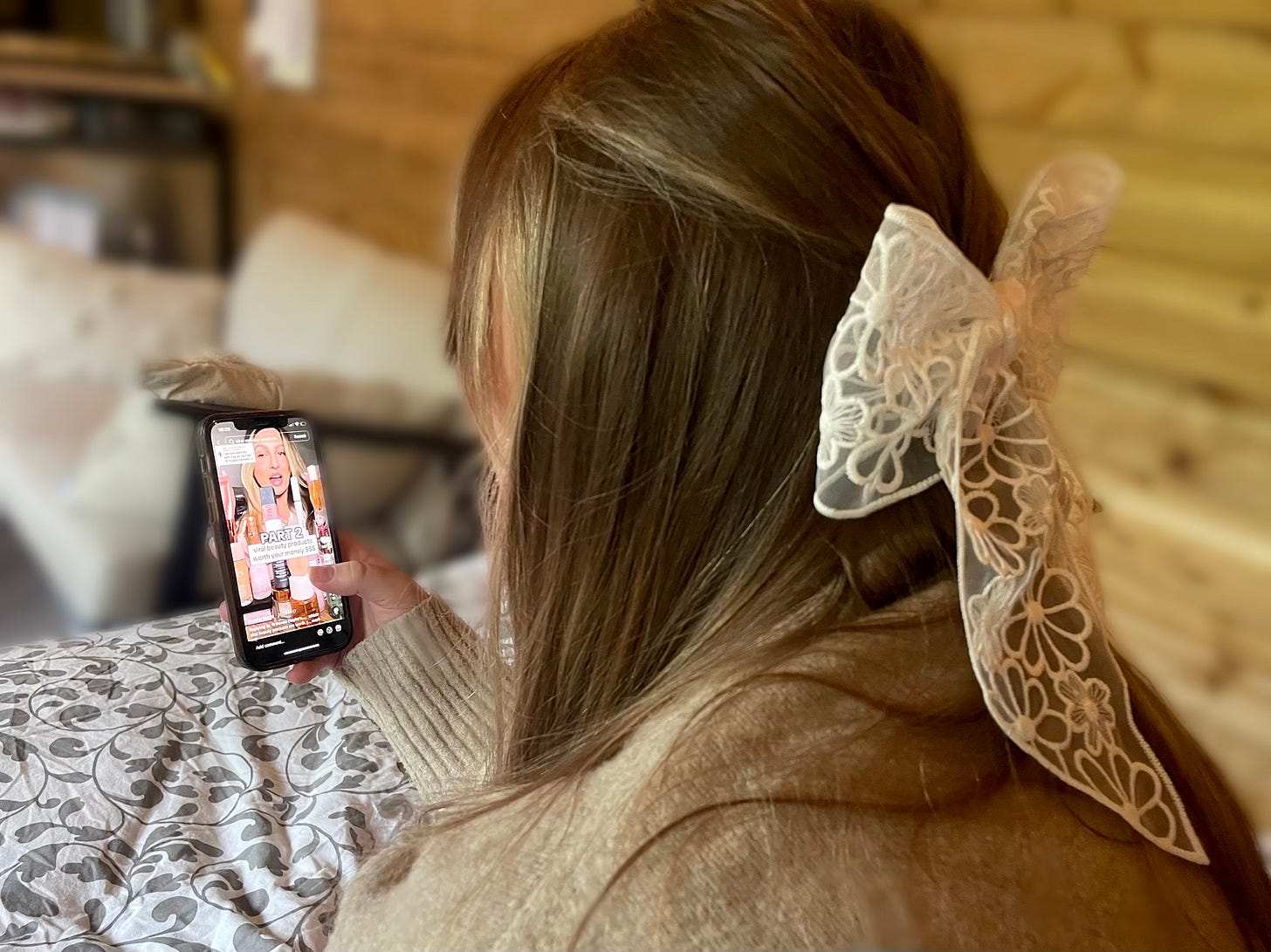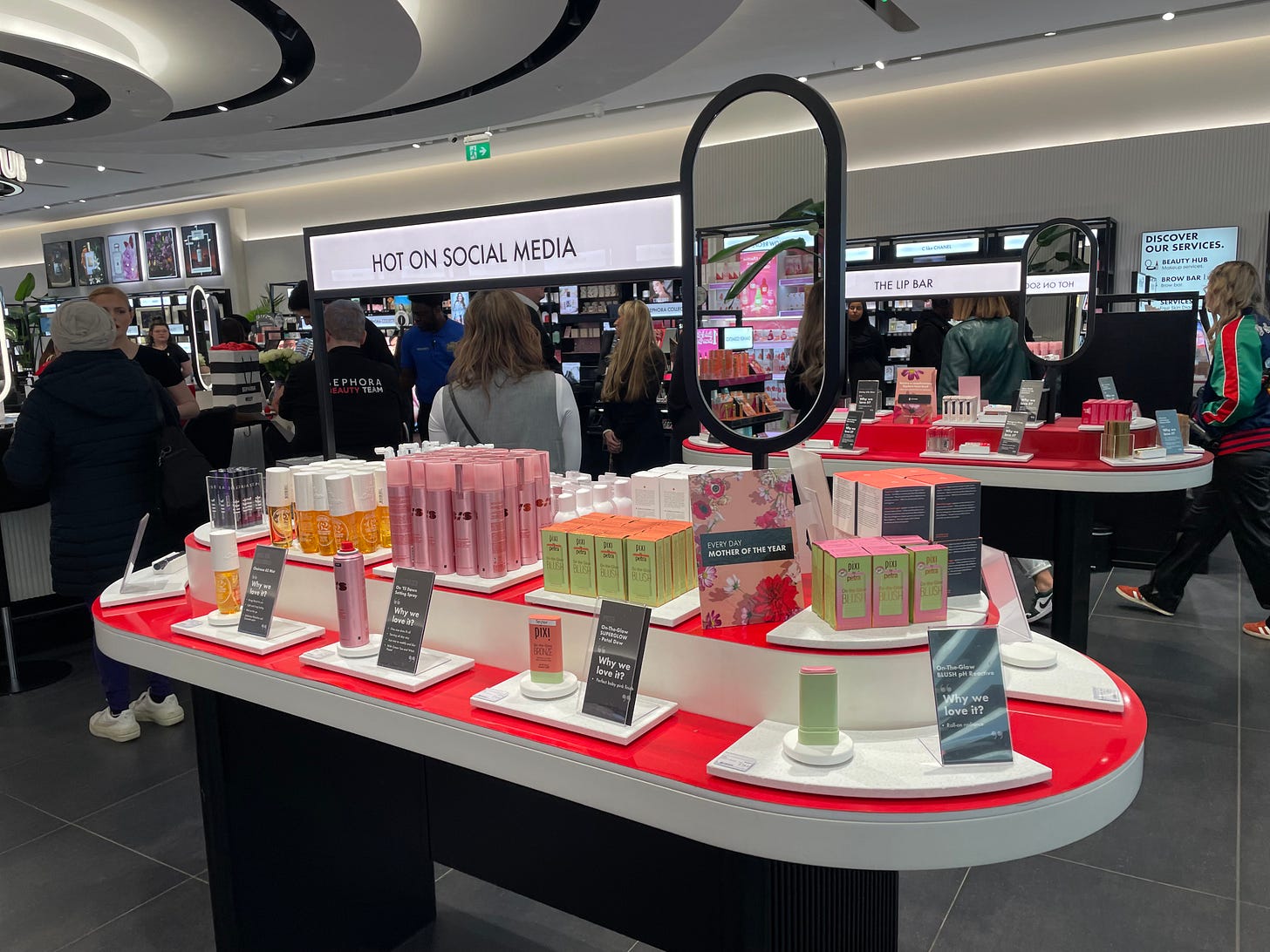Beauty FOMO Unmasked: The Temptation to Purchase Everything You See Online
In the digital age, where our feeds are flooded with tantalising product launches and glowing reviews, it's easy to succumb to the allure of Beauty FOMO. What exactly is this phenomenon?
Well, it's the fear of missing out on the latest and greatest beauty products showcased on social media platforms. And trust us, you're not alone in feeling the pull of this modern marketing sensation.
From Instagram to TikTok, brands take advantage of FOMO marketing to generate buzz around their products. Limited edition releases and exclusive discounts are the bread and butter of this strategy, creating a sense of urgency that sends consumers scrambling to add their desired items to their carts. But what impact does this relentless marketing tactic have on our psyche? We turned to the experts to find out.
Dr. Holly Shiff, a psychologist, sheds light on the psychological basis of FOMO marketing. She explains: “Fear of missing out marketing absolutely impacts social media users on apps like TikTok and Instagram; it can create or worsen shopping addiction.”
She adds: “Emotions drive decision-making and fear can absolutely be influential in consumer behaviour. It is part of our human instinct to be a part of something and not miss out on an opportunity. This kind of marketing also taps into the idea of social comparison, there is a commonly felt anxiety relating to being left out or falling behind. People don't want to lose out on something, especially if it seems more valuable because of a limited-time offer, exclusive access, or a short supply. There is also a sense of urgency which can lead to more impulsive shopping behaviour because you don't have the luxury of time to sit and think about it before completing the purchase.”
According to Samantha Ribakove, PR specialist,: ”Brands are actively taking advantage of this and marketing the scarcity of products. They’re creating brand owned social content or working with creators to create UGC that speaks directly to the “urgency” and need to shop a product that’s limited quantities or limited time pricing. However, this is definitely fuelling shopping addictions and increased consumer spending.”
It's not just the scarcity factor that's at play here. Social media algorithms also play a significant role in shaping our shopping habits. Platforms like TikTok curate our feeds based on our preferences, serving up content that aligns with our interests. So, if you've been binge-watching “Get Ready With Me” or haul videos, don't be surprised when your For You Page becomes a virtual shopping mall.
Take for example, the recent buzz surrounding Rare Beauty's latest blush release. Thanks to glowing reviews and viral TikTok videos, the product became a sensation, with consumers rushing to get their hands on it. But amidst the hype, it's essential to pause and ask ourselves: Do we truly need another blush when our makeup drawers are already overflowing?
So, what's a beauty enthusiast to do in the face of relentless FOMO marketing? Isabelle,22, a self-proclaimed TikTok addict, offers her take. While she admits to being swayed by viral products on her feed, she's learned to exercise caution and question whether each purchase is truly necessary. After all, shopping should be a source of joy, not anxiety-induced impulse buys.
“I try to not buy everything I see instantly, I did put a rule in place because I was buying everything. If I think of it at least for an entire week then I’ll get it.”
Dr.Holly Shiff added: “when we make a purchase, our brain releases dopamine and endorphins, this momentary pleasure can lead to compulsive shopping or a shopping addiction. The instant reward and motivation to re-experience that "rush" starts to outweigh self-control, logic, and financial considerations.”
Social media influence is undeniable, especially when the content isn't a sponsored post. Authenticity is key, and users tend to trust the unfiltered voices of everyday people. The trend #TikTokMadeMeBuyIt is a captivating showcase of authentic people giving their opinion on products they have been influenced to buy. Dr. Holly Schiff adds: “This is more powerful because when it comes to being a consumer, they trust real people more. Psychologically, as humans, we are easily swayed and convinced to do what other humans are doing.”
Even as FOMO marketing on social media primarily targets Millennials, Gen Z, and even the emerging Gen Alpha, it's fascinating how individuals of all ages find themselves drawn into the TikTok vortex.
Take Susan, a 65-year-old who surprises even herself with her addiction to the platform. "I never thought I'd be hooked on a social media app." she confesses, "but TikTok has a unique way of pulling me in." Susan, much like countless others, finds herself captivated by the irresistible charm of FOMO marketing, enthusiastically adding beauty and fashion treasures showcased on her TikTok feed to her shopping cart. To her, the platform is more than just scrolling, it feels like she's receiving personalised recommendations from friends she can trust as she navigates her shopping journey.
But here's the burning question: will the popularity of these trendy products stand the test of time? The truth is, it's a gamble. While some game-changing innovations have the potential to remain in vogue indefinitely, predicting the longevity of a trend is anything but certain.
Reilly Newman, PR specialist, gives his take on this intriguing dilemma: “Since we are mainly speaking in the context of social media we are dealing with extreme FOMO since a lot of this is fuelled by social pressures. These pressures are very high when you look at the beauty and fashion industry which creates trends to increase the movement of products and create "expiration" for those products that may still be viable just not trendy anymore.”
One thing remains clear: the beauty world is constantly changing, with each scroll unveiling a new must-have product or viral sensation. While FOMO marketing create excitement and drive impulse purchases, it's crucial to approach each buying decision with mindfulness. So, whether you're swiping through TikTok or scrolling through Instagram, take a moment to reflect, and choose wisely. Most importantly, in a world of transient trends and viral sensations, authenticity and self-awareness will always be in vogue.







